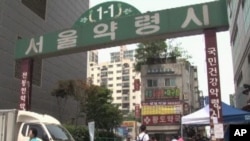For the past 600 years, Koreans have gone to Yang-yeong-si market in Seoul to acquire herbal remedies and seek out advice and treatment for their illnesses.
There is more than just ginseng being offered in the 1,000 shops in Yangyeong-si. Here, health professionals and patients alike seek out roots, grains, branches and leaves - as well as more exotic ingredients, such as dried insects and deer antlers - for traditional treatments.
Kim San-gu has been running this herbal pharmacy for a quarter of a century. He sells about 300 different types of remedies, preparing most of them on site. In recent years, Kim acknowledges, business has slackened.
"These days, people tend not to trust Korean medicine so much because they see Western medicine as so advanced," said Kim. "They prefer to go to hospitals instead of using Korean medicinal herbs. But there are many cases where Western medicine is ineffective and people get cured only after using traditional Korean medicine."
The first Chinese medical books came to Korea about 1,100 years ago. After that, Korean medicine grew and evolved, putting the emphasis on treating patients in a distinctive manner rather than just focusing on the symptoms of specific diseases.
A few kilometers from the old market, Korean medicine is continuing to evolve. At the Jaseng Hospital of Oriental Medicine, which specializes in spinal disorders, Austrian native Raimund Royer is among the licensed doctors of traditional medicine who combine the Eastern methods, such as acupuncture, with modern technology.
"…we have MRIs, we have X-rays, we have CT scans, we have blood tests. So for the diagnosis, we utilize these kinds of methods. But for treatment itself, we are relying on the traditional way. So I think it's a very good and maybe future-pointing kind of approach to combine, to integrate both the Western diagnostic system and the traditional treatment system," said Royer.
This hybrid approach is creating a renewed interest in traditional medicine among South Koreans. It is also attracting the attention of Western medical professionals, looking for alternatives to surgery and powerful pharmaceutical drugs.





